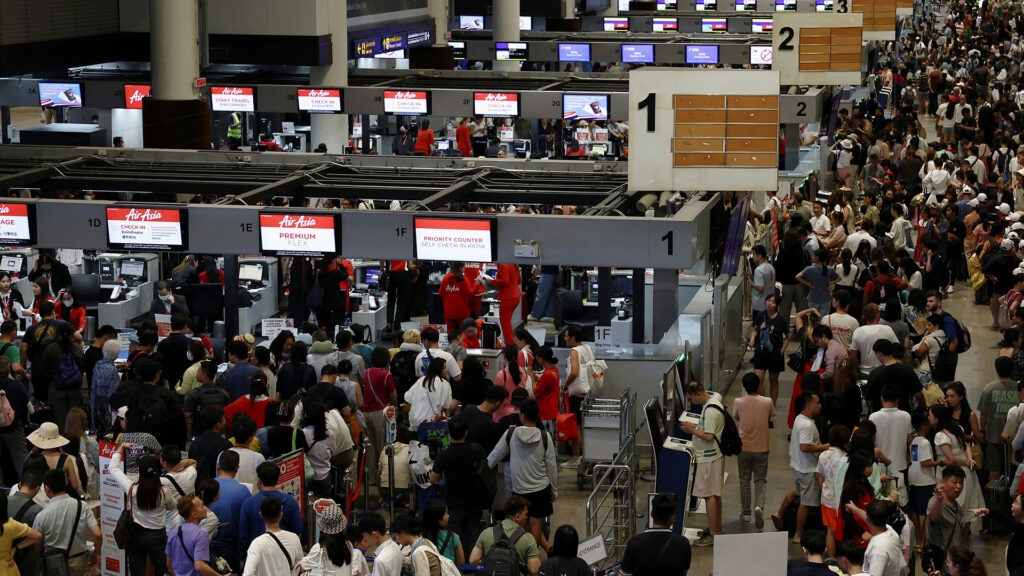A global technology outage: unraveling our dependence on few tech giants
A global technology outage grounded flights, disrupted banking systems, and knocked media outlets off the air on Friday, causing a massive disruption that highlighted our global dependence on software from a limited number of providers. The incident, affecting companies and services around the world, serves as a stark reminder of how intertwined our daily operations are with digital technology.
The incident
Microsoft announced that the “underlying cause” of the outage had been fixed for its applications, but residual impacts continued to affect some services. The issue’s root was identified as an update from a third-party software platform, later confirmed to be from the cybersecurity firm CrowdStrike. The faulty update, which was not a result of a security breach or cyberattack, caused significant disruptions.
CrowdStrike explained that a defect in one of its software updates impacted computers running Microsoft Windows. This issue led to major IT outages affecting industries globally, with nearly 1,400 flights cancelled and significant impacts on the banking, healthcare, and retail sectors. The blackout had far-reaching consequences. Sky News went off the air in the UK for several hours, and chaos ensued at dozens of airports. The largest rail operator in Britain warned passengers of disruptions, while banks, shops, supermarkets, and other organizations continued to feel the effects of the blackout.
Cybersecurity experts, including Elon Musk, who called it the “biggest IT fail ever” on X (formerly Twitter), emphasized that although a software fix had been deployed, restoring full functionality to affected computers would take substantial effort.
“The mantra of cybersecurity has long been patch early, patch often. This gospel of applying security updates promptly remains vital in the face of relentless cyber threats. However, today’s widespread outage caused by a faulty CrowdStrike update exposes a critical truth: the fundamentals of cybersecurity, while essential, are rarely straightforward.
In the cybersecurity community, we often champion a “focus on the basics” – asset inventory, patching, network segmentation, identity and access management, etc. – as the cornerstone of the defence. Today’s incident serves as a wake-up call. Though seemingly straightforward, these fundamentals can be surprisingly intricate and fraught with potential pitfalls. This is not to downplay the importance of patching.
Rather, it highlights the need for a nuanced approach. We must acknowledge the vital role of rigorous testing within the security software industry and consumer organizations before deploying patches. This, coupled with open communication between vendors, IT professionals, and end-users, is vital. The delicate dance between vigilance and potential disruption necessitates ongoing collaboration to ensure the very foundations of our digital security are not the weak link. In short, just because something is basic doesn’t mean it is easy or straightforward,” comments Chris Denbigh-White, CSO at NextDLP, speaking to 4i Magazine about the global technology outage.


Global technology outage: affected sectors
Several companies and sectors were hit hard by the global technology outage.
Airlines: American Airlines, Delta Airlines, and United Airlines experienced flight disruptions. Airports in Germany and Spain faced significant issues, and Edinburgh Airport’s scanners went offline.
Emergency Services: The 911 emergency line in Alaska failed, leaving officials scrambling to manage the situation.
Healthcare: In Northern Germany, hospitals in Lübeck and Kiel cancelled non-urgent surgeries due to IT system problems linked to CrowdStrike.
Financial Services: The London Stock Exchange and the UK’s National Health Service (NHS) patient appointment platform encountered difficulties.
Global Reach: Issue reports came from Europe, India, the USA, Australia, and New Zealand. Australia’s media, banking, and telecommunications companies faced technical glitches connected to CrowdStrike.
Global technology outage: Underlying causes
The exact cause of the outage remains under investigation, but preliminary findings point to a software update from CrowdStrike intended for computers running Microsoft’s operating system. CrowdStrike’s CEO confirmed that the issue was isolated to Windows hosts, with Mac and Linux systems unaffected. The company is actively working with impacted customers to address the defect. CrowdStrike reassured its users that the problem was not a security incident or cyberattack. They have deployed a fix and are providing continuous updates through their support portal and official channels to ensure customer security and stability. Various governmental and corporate entities have responded to the situation. The UK Ministry of Defence reported monitoring the incident, confirming that it was unaffected. There was no evidence of hostile involvement, and the German Federal Ministry of the Interior also ruled out a cyberattack, stating that the disruptions caused severe problems at airports, banks, and television stations.
Lessons learned: dependence on technology and the risks
This global technology outage underscores several critical lessons about our relationship with technology and our dependence on the internet, particularly when a few major companies control it.
The incident revealed how interconnected and vulnerable our systems are. When a key service provider like CrowdStrike encounters an issue, the ripple effects are felt worldwide. This level of dependency on a few companies for critical software and security solutions puts various sectors at risk of widespread disruption. Organizations must develop robust contingency plans to mitigate the impact of such outages. This includes having backup systems, regular software audits, and comprehensive disaster recovery strategies. Diversifying technology providers could also reduce the risk of a single point of failure affecting multiple sectors simultaneously. Although this was not a cyberattack, it highlights the importance of cybersecurity and rapid incident response.
Global technology outage
Companies need to be prepared for both security breaches and technical failures. This involves continuous monitoring, quick identification of issues, and efficient communication with stakeholders. The incident calls for increased regulatory oversight and collaboration among tech companies and governments. Establishing clear guidelines and protocols for software updates and incident response can help prevent similar occurrences in the future. Collaborative efforts can ensure a coordinated response, minimizing disruption and enhancing system resilience. There is also an ethical dimension to consider. Major tech companies must be accountable for the tools and services they provide. Transparent communication about issues and proactive measures to address them is essential. Companies like CrowdStrike must prioritize their customers’ stability and security, ensuring that updates and changes do not inadvertently cause harm.
The recent global technology outage is a wake-up call about our heavy reliance on a few tech giants and the need for greater resilience in our digital infrastructure. By learning from this incident, we can build more robust, secure, and diversified systems that can withstand such disruptions in the future. The key takeaway is clear: while technology is integral to our modern lives, we must be vigilant and prepared for the challenges that come with our increasing dependence on it.



